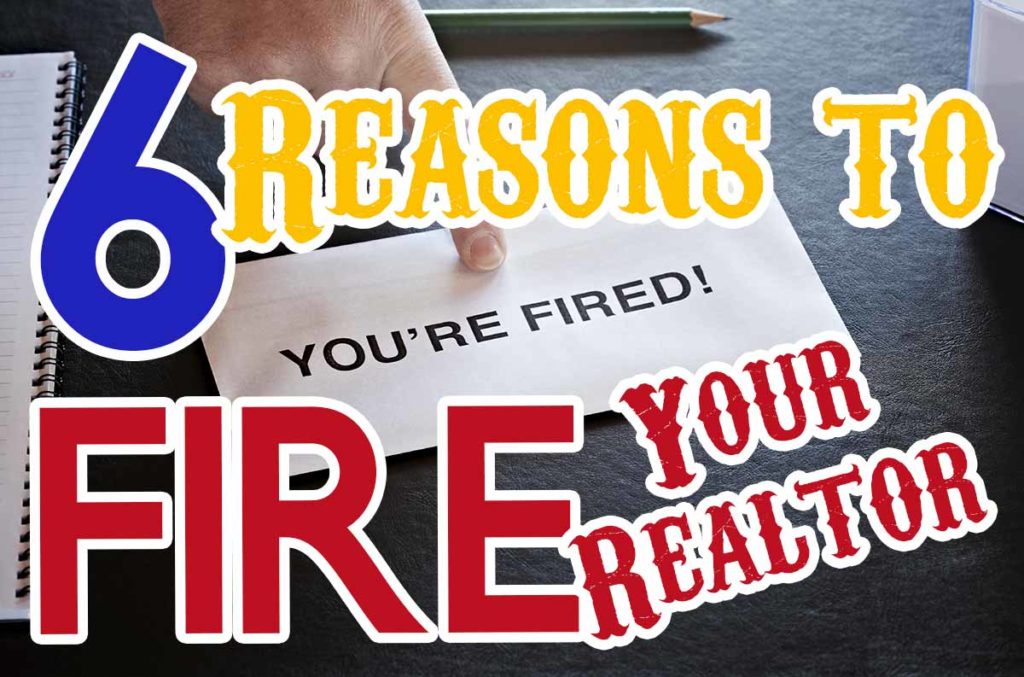
Takeaways
- Screening clients and being selective is a lot better than firing them later on
- Don’t burn bridges
- Good expectation management early will solve 90% of these problems
I’ve written previously about various reasons a buyer or seller might consider firing their Realtor. Now I’ll write about the reverse – a real estate agent firing their client.
“What? An agent can fire their client?”
Absolutely.
The listing or buyer representation agreements go both ways, and in rare cases, it absolutely makes sense for an agent to move on from a client.

When to Fire Your Realtor
- Interview several agents before hiring
- Take the listing or representation agreement seriously
- Watch out for warning signs
Being Unreasonable
I personally have only once tried to fire a client, and it was because I felt they were being unreasonable. They were very serious – in fact, we already had an executed contract and were halfway to closing. My seller was trying to use a delay in closing to extract what, in my opinion, were extreme and uncharacteristic demands from the buyer. I essentially said I wouldn’t send the amendment and offered to terminate the listing instead, forgoing my commission if it still closed. In my case, the seller relented to my advice instead of signing the termination. We closed, and are still on good terms today.
Don’t you have an obligation to obey your client?
Yes. There was nothing unethical or illegal about what my seller wanted me to do, and a Realtor does have an ethical duty to obey their client. So, the recourse is to make them no longer your client.
Some examples of red flags are:
- Expecting or insisting on concessions that are not typical for the market
- Wanting to see a gazillion homes instead of narrowing it down (a buyer should be able to narrow it down to approximately 10 homes)
- Calling at crazy hours or upset when you don’t answer or can’t call back immediately because you are with another client
- Lowball offers (lowballs have their time and place, but not in every situation)
At some point, clients like these might be taking away from your business, your personal life, and your peace of mind. Further, their unreasonableness means they are far less likely to actually close. It’s okay to fire them.
How to Avoid This Problem
- Prepare a thorough seller’s estimated net for your seller so they know what to expect in our market, especially regarding common seller concessions
- Establish expectations early (e.g. narrow it down to 10 homes to view, I answer calls between 9AM and 7 PM, we will do a total of two open houses, etc.)
- Talk about the inspection before they start viewing homes, making sure they understand that no home is going to be perfect, even new construction sometimes. No sense spending good money on inspections that will never be good enough.
They are Not Serious
This was my #1 biggest surprise when I became an agent. There are a lot of buyers who are not serious about buying. These are the dreaded “tire kickers” and time wasters that every agent is familiar with.
In fact, I would estimate that early in my real estate career nearly half my time was spent with buyers and sellers who ultimately did not buy or sell anything. It is not always their fault. Sometimes they don’t know that they are not serious until they’ve seen homes and realize this isn’t the right decision for them.
This problem is more prevalent among buyers than sellers. But sellers can also sometimes put their home on the market for an unserious price. Their attitude is “if someone is willing to overpay, I’ll sell”. An agent shouldn’t be taking on that kind of listing, anyway.
How to Help Avoid This Problem
- Do a thorough buyer consultation early
- Do thorough expectation management – the time it will take, inspections won’t be perfect, how much home you can get for your money, etc.
- Obtain a preapproval letter from their lender prior to showing homes
- Review a seller’s mortgage payoff and compare to the seller’s net to ensure that the numbers will work for them
Unethical Behavior
Either unethical behavior themselves, or demanding that you do something unethical or illegal, is an obvious reason to respectfully move on from a client.
Obviously, they may not know what they are asking or doing is unethical or illegal, so point it out quickly. If they still insist on doing it, or insist you do it in order to represent them, that should be an easy “Thanks but no thanks”. A single commission isn’t worth your license.
Examples include:
- A buyer who is using owner occupant financing (e.g. VA) for a property they clearly don’t intend to occupy
- A seller who doesn’t disclose issues they are required to disclose
- Any fair housing issues
How to Avoid This Problem
- Ask your clients lots of open-ended questions during the listing presentation or buyer’s consultation to ensure you understand what they are looking to accomplish and that it squares with your legal responsibilities as an agent.
Personality Clash
I know an agent who worked hard for her clients throughout the entire process, with no issues. At the closing table, the clients tried to reduce her commission to save themselves some money at her expense (after she had already discounted her commission once). The agent was shocked. The broker had to get involved to make things right. After what she thought had been a great transaction with folks she got along with, the agent literally left the title company in tears.
That’s not healthy.
Agents are obviously here to provide a service, and you don’t have to be best buddies to get and give the best service. But you should also at least have a good, respectful working relationship.
How to Avoid This Problem
- Meet with them early, and ideally in the office or public place. If they are disrespectful, you feel unsafe, or you just get bad vibes, you may want to consider politely referring them to some other options.
- Ignore disloyal prospects (e.g. a would-be buyer who has signed agreements with multiple other agents, or who has never met you but has to see a house in the next hour or they’re going to use another agent)
How to Break Up
First, try to salvage the relationship. Have an intervention. Be upfront with your client with what issues you are having, and give them a chance to address them.
If it is already past that point, you need to formally end the relationship. In Texas, you need to get the listing termination or buyer’s representation termination signed.
If you are at this point, there is probably some tension between you and your client. It is critical that you approach the situation respectfully and calmly. Don’t just send a termination via DocuSign. Walk through the process so that it is graceful and they aren’t left hopping mad and ready to tank your Facebook reviews out of spite. I recommend doing the following:
- Politely explain the issue that you think may not make you a good fit for them
- Recommend better options (other agents, renting, waiting a year, etc)
- Forgo your commission, even if you may technically have already procured a buyer or home. You are the one choosing to stop serving them as their agent, after all. This isn’t a hard and fast rule depending on the situation, like if the specific issue is their trying to cheat you of an earned commission.
- Don’t burn bridges. You never know when a client might see the light. Or, just because you fired them doesn’t mean they dislike you. You can even get referrals from a client that didn’t work out.
- Be professional and polite even in the hairiest of situations. It won’t help you or your business to make a situation more difficult than it has to be.
Conclusion
If you get anxiety when you see a text or an incoming call from a particular client, it may be time for an intervention. And if that doesn’t work…
Nobody wants to fire a client. And we are always as agents looking for ways to try to make it work. But sometimes a client it taking up time that you need to be applying to other clients, or your business. Real estate agents are not charities, therapists, or BFFs-for-hire. They are service professionals who must take their business seriously.
It is an acquired skill that comes with lots of experience in the business, but screening and being selective about your clients is important, even when it sometimes means turning down business.
